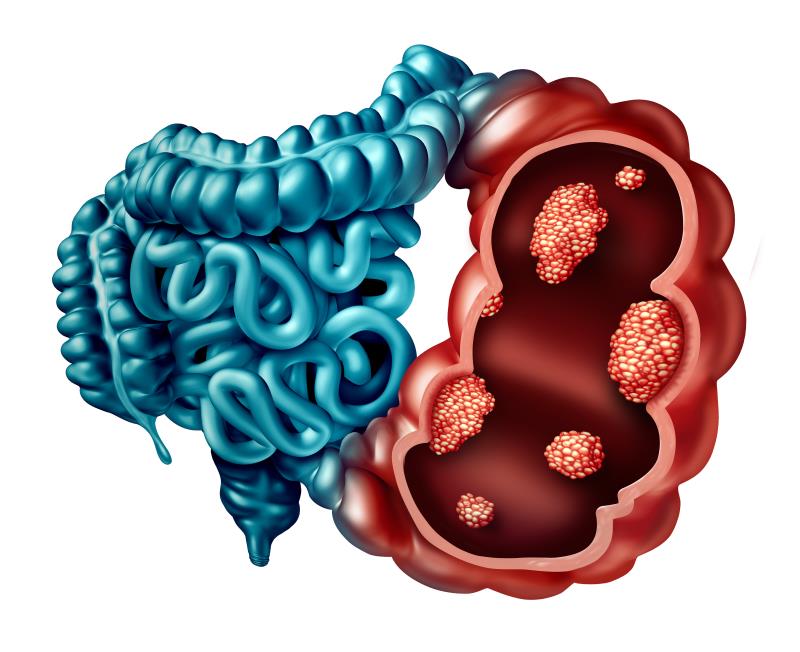Lower CRC risk with ACEis, ARBs?





The use of angiotensin-converting enzyme (ACE) inhibitors or angiotensin receptor blockers (ARBs) may be associated with a reduced risk of colorectal cancer (CRC), according to a retrospective cohort study from Hong Kong.
“While ACE inhibitors and ARBs are taken by patients with high blood pressure, heart failure, and kidney diseases, the reduction in CRC risk may be an additional factor for physicians to consider when choosing anti-hypertensive medications,” said study author Associate Professor Leung Wai Keung from the University of Hong Kong in Hong Kong, China.
This study involved 187,897 patients aged ≥40 years (median age 60.6 years, 48.9 percent male) who had a negative result on a colonoscopy done between 2005 and 2013, as listed in the Clinical Data Analysis and Reporting System database of the Hong Kong Hospital Authority. Of these, 16.4 percent (n=30,856) were ARB/ACE inhibitor users (≥180-day use within 5 years before baseline colonoscopy; median age 70.6 years, 54.6 percent male, median use 3.3 years). Patients with a history of CRC (up to <6 months pre-baseline colonoscopy), colectomy, or inflammatory bowel disease were excluded.
Among ACE inhibitor/ARB users, 26.8 percent had a history of colonic polyps, 16.1 percent had undergone polypectomy, and 42.8 and 38.4 percent were aspirin and statin users, respectively.
CRC was diagnosed in 854 patients (0.45 percent; median age 75.9 years) between 6 and 36 months after colonoscopy (median time 1.2 years post-colonoscopy), of which 147 were proximal cancers. A total of 169 CRC cases were diagnosed among ACE inhibitor/ARB users.
Use of ACE inhibitors/ARBs was associated with a reduced risk of CRC <3 years after baseline colonoscopy (PCCRC-3 years; adjusted hazard ratio [adjHR], 0.78, 95 percent confidence interval [CI], 0.64–0.96; p=0.020), with an absolute risk reduction of 3.2 per 10,000 person-years compared with non-users. [Hypertension 2020;doi:10.1161/HYPERTENSIONAHA.120.15317]
In contrast, ACE inhibitor/ARB use did not reduce the risk of CRC >3 years (n=436; median 5.2 years) after baseline colonoscopy (adjHR, 1.18, 95 percent CI, 0.88–1.57; p=0.26).
Longer duration of ACE inhibitor/ARB use was associated with a lower risk of PCCRC-3 years (adjHR, 0.77 vs 0.85 for ≥2 vs <2 years of use) compared with non-users. Every 1-year increase in ACE inhibitor/ARB use was associated with a 5 percent reduced risk of PCCRC-3 years (HR, 0.95; p=0.040).
Use of ACE inhibitors alone for ≥2 years was associated with a reduced risk of PCCRC-3 years (adjHR, 0.75; p=0.016 vs non-use), though the effect did not apply to ≥2 years of ARB use alone (adjHR, 0.51; p=0.066). Subgroup analysis showed that the reduced risk of PCCRC-3 years with ACE inhibitor/ARB use was limited to individuals aged ≥55 years (adjHR, 0.79) and those with a history of colonic polyps (adjHR, 0.71), as well as in distal (adjHR, 0.77; p=0.027) but not proximal cancers (adjHR, 0.83; p=0.456).
“The roles of ACE inhibitors and ARBs on cancer development are controversial and, in some cases, study findings are conflicting. Results of previous studies have been limited by several factors including a small number of patients and data only on short-term follow-ups,” said Leung.
“This is the first study to show the potential beneficial effects of ACE inhibitors and ARBs on CRC development, based on a large group of patients who were CRC-free at the beginning of the study,” he said.
“Since adenoma-carcinoma progression could take up to decades, our results may imply that ACE inhibitors/ARBs exert their effect by inhibiting progression of missed adenomas or cancers that develop rapidly through alternative pathways,” said Leung and co-authors, suggesting a potential mechanism of action.